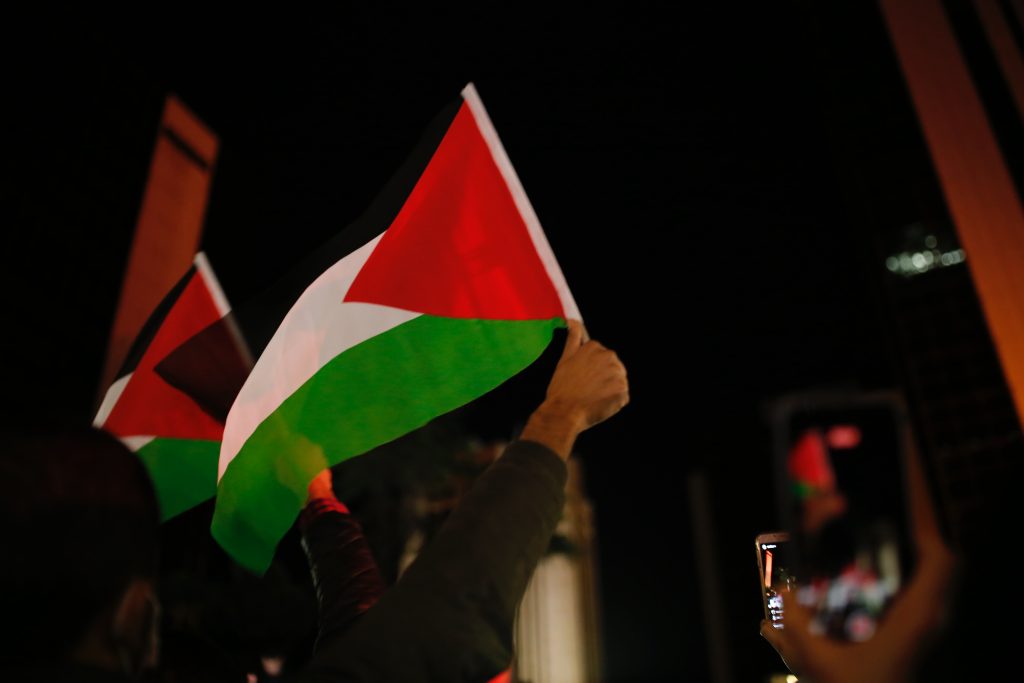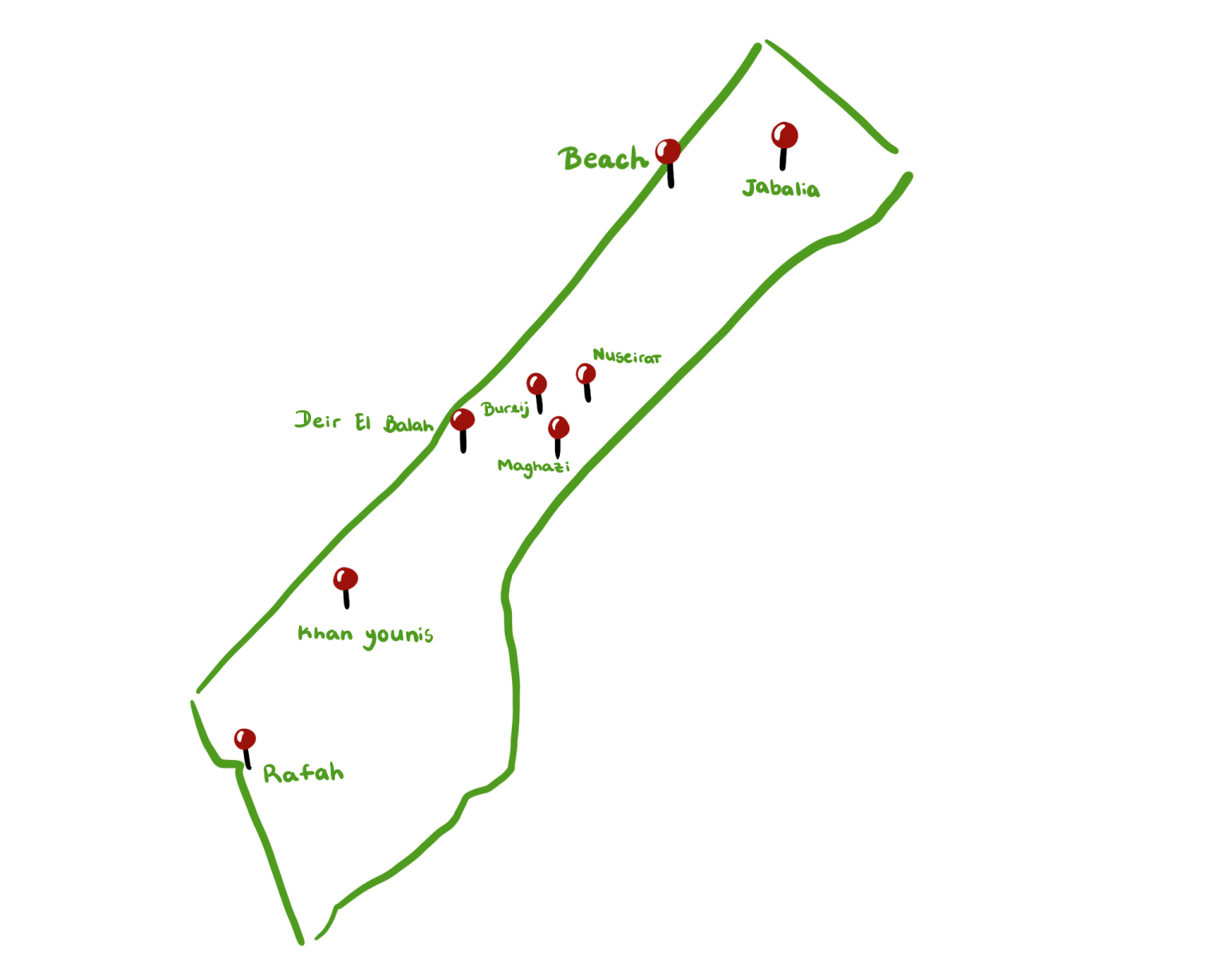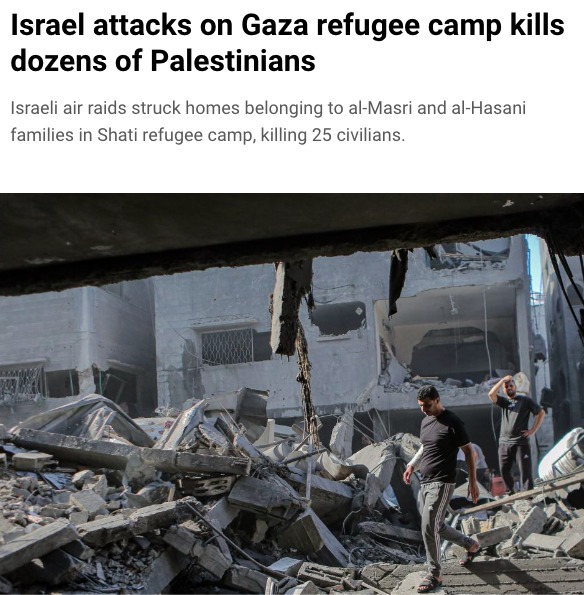Palestine: questions and answers
by Mafalda Azevedo

Who is a “Palestinian Refugee”?
In 1952, the UNRWA defined them as “persons whose normal place of residence was Palestine during the period 1 June 1946 to 15 May 1948 and who lost both home and means of livelihood as a result of the 1948 conflict.”, and descendants of fathers of those who fit this definition.
We have heard that people in the Gaza Strip are sheltering at UNRWA schools and that these have been targeted and attacked these past two weeks, but what is the UNRWA?
It is the United Nations Relief and Works Agency for Palestine Refugees in the Near East. It was created in 1949, and it is under mandate by the General Assembly to serve Palestinian refugees and to offer humanitarian assistance to those displaced by the ongoing Israeli occupation. But, the UNRWA cannot resettle refugees or administer refugee camps; it is a service provider for education, health, social services, among others – some compare it to an almost state, since it provides for the services a state would.
Are there Palestinian refugees within the Gaza Strip, or did they all resettle in different states?
The Gaza Strip has a population of 2.3 million people, out of these 1.7 million are registered as Palestinian Refugees with the UNRWA – so more than 60% of the Gazan population are registered as Palestinian refugees. They are distributed by the eight refugee camps within Gaza.

But, are refugee camps being attacked and targeted?
Well, unfortunately, yes. Still, since 2007, the UNRWA has described the conditions perpetrated by the Israeli government in Gaza as collective punishment – even before any targeted airstrike that we witnessed this past two weeks.
Wait, 2007? But, collective punishment, what is that?
When the Hamas – Islamic Resistance Movement – gained control over the Gaza Strip in 2007, the Israeli Government imposed a land, air and sea blockade over Gaza. The blockade aimed to isolate Hamas and prevent the smuggling of weapons. However, since 2007 it has prevented the circulation of essential goods and has limited the Gaza’s residents freedom of movement. Meanwhile, as of 2022, the price of flour within Gaza had increased by 22,7% and eggs by 27,2%. That is why the United Nations has described the Israeli actions since 2007 as collective punishment.
But, what is collective punishment? Is that allowed?
Essentially, it is when a sanction is imposed on a group of people in response to a crime committed by one of them or a member of the group. International humanitarian law prohibits the imposition of collective punishment.
From 2007 to 2023, couldn’t the Palestinian Refugees just leave Gaza? Go back home or resettle in some other country?
Well, for many of them Gaza is their home, many of them are descendants of Palestinian refugees, making them refugees – naturally, you wouldn’t want to leave your home. Even if they wanted, Gaza is commonly described as an “open-air prison”.
If they are from any other Occupied Palestinian Territories (OPT), they can’t just go back home.
Palestinian refugees’ right to return is recognised by international law, which is also a fundamental right for the realisation of Palestinians’ right to self-determination. It is their right to return to their homeland. So, after 1948 any Palestinian refugee from, for example the West Bank, who was displaced to Gaza is protected by international law to return home.
However, for 70 years Israel has been refusing to grant Palestinian refugees the fulfilment of their right to return.
As for resettling in some other country, that could’ve been an option before the tightening of the blockade which happened two weeks ago.
Most Palestinian refugees resettle in Lebanon, Jordan or Syria. However, not all Palestinian refugees have the same rights – dependent on the Palestinian territory they are from. For example, in Jordan, Gazans are barred from acquiring Jordanian nationality, so they will continue to be dependent on the services provided by the UNRWA. Essentially, they could resettle. Yet, it is difficult for them to be truly home and be granted a full catalogue of social, cultural, economic and political rights – naturally, dependent on the national legislation of the host countries.
So, what is happening right now?
Due to the blockade, no one can leave, regardless of registration as a Palestinian refugee or not.
So far, the Israeli airstrikes have killed 8,000 Palestinians and injured many thousands more in the Gaza Strip. On the 31st of October, an attack on the Jabalia Refugee Camp – the largest camp in the region – killed 50 people.
Meanwhile,
we can protest, educate ourselves and others, while we actively pressure our governments to reach an agreement for a long overdue ceasefire.
References
- https://www.unrwa.org/who-we-are/frequently-asked-questions
- https://www.migrationpolicy.org/article/palestinian-refugees-dispossession
- https://www.unrwa.org/where-we-work/gaza-strip
- https://www.aljazeera.com/gallery/2023/10/13/israeli-attack-on-gaza-refugee-camp-kills-dozens-of-palestinians
- https://www.unrwa.org/activity/protection-gaza-strip
- https://reliefweb.int/report/occupied-palestinian-territory/al-mezan-warns-gaza-global-recession-and-financial-crisis-are-bringing-hundreds-thousands-palestinians-their-knees
- https://www.ohchr.org/en/press-releases/2013/06/collective-punishment-gaza-must-end-israels-blockade-enters-its-7th-year-un
- https://www.ohchr.org/en/press-releases/2013/06/collective-punishment-gaza-must-end-israels-blockade-enters-its-7th-year-un
- https://www.amnesty.org/en/latest/press-release/2019/05/israels-refusal-to-grant-palestinian-refugees-right-to-return-has-fuelled-seven-decades-of-suffering/
- https://www.theguardian.com/world/2023/oct/23/gaza-second-aid-convoy-rafah-crossing-israel-bombardment?utm_campaign=later-linkinbio-guardian_us&utm_content=later-38709526&utm_medium=social&utm_source=linkin.bio
- https://www.reuters.com/world/middle-east/gaza-health-ministry-3785-palestinians-killed-israeli-strikes-since-oct7-2023-10-19/
